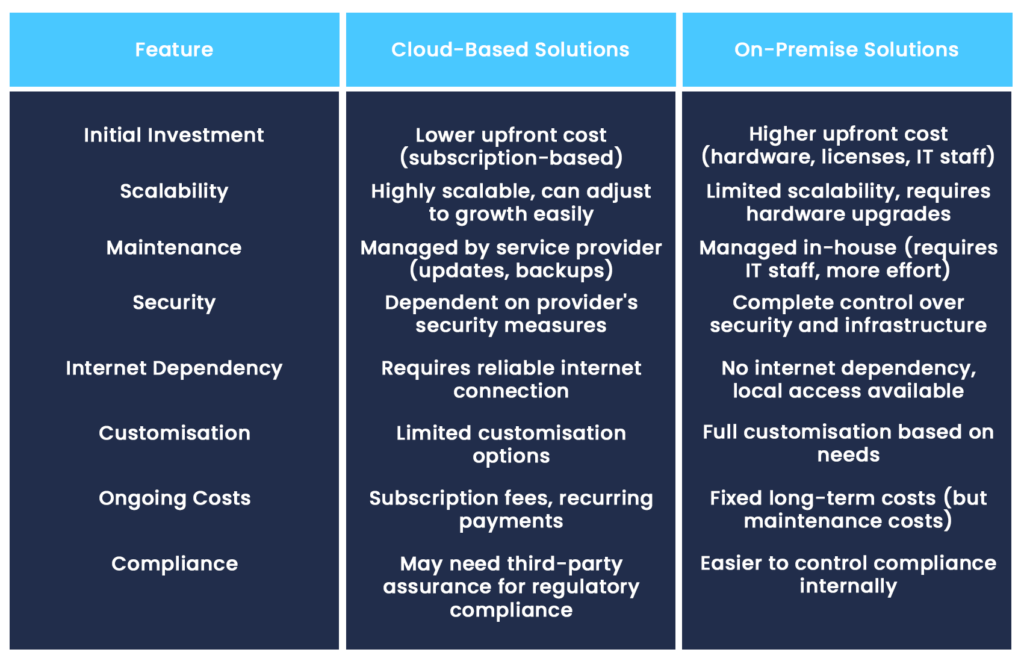The midstream oil and gas industry has long been known for its reliance on traditional infrastructure and legacy systems. However, with the rapid advancement of technology, a fundamental shift is underway. Midstream oil and gas companies involved in the transportation, storage, and wholesale marketing, are increasingly turning to cloud-based solutions to modernise their operations.
Moving to the cloud is not just a trend but a necessity in an industry grappling with volatility, growing operational complexity, and the demand for enhanced efficiency and safety.
Cloud-based solutions are emerging as critical tools to address these challenges. They provide a scalable, flexible, and secure environment allowing midstream oil and gas companies to streamline operations, improve decision-making, and lower costs. By leveraging the cloud, these companies can access real-time data, enhance collaboration across dispersed teams, and implement advanced analytics and automation that were previously out of reach.
The transition to the cloud is enabling midstream companies to adapt to the changing landscape of the energy sector and take a proactive role in shaping its future.
As the industry continues evolving, cloud-based technology is becoming a cornerstone for driving innovation, improving efficiency, and ensuring sustainability in a highly competitive and unpredictable market.
Key Benefits of Cloud-Based Solutions in Midstream
Below are the key benefits of cloud-based solutions in the midstream sector.
Remote Access and Real-Time Collaboration
One of the standout advantages of cloud-based solutions is the ability to facilitate remote access and real-time collaboration across a geographically dispersed workforce. For midstream companies, operations often span vast regions, including pipelines, storage facilities, and terminals, which may be located in remote or difficult-to-reach areas.
Traditional on-premise systems could make it challenging for employees to access critical data, but the cloud removes these barriers.
Cloud platforms provide secure, centralised access to operational data from anywhere with an internet connection. This not only enhances teams’ ability to make informed decisions quickly but also improves coordination among different departments, such as logistics, engineering, and maintenance, ensuring that they are all aligned in real time.
Improved Data Security and Disaster Recovery
Data security is a major concern in the midstream oil and gas industry, given the sensitive nature of operational and financial information. Cloud-based solutions offer sophisticated security measures that help midstream oil and gas companies safeguard their critical data.
Top-tier cloud providers employ advanced encryption, multi-factor authentication, and regular security updates to ensure that sensitive information remains protected from cyber threats.
Moreover, cloud platforms are designed with disaster recovery in mind. Traditional on-premise systems can be vulnerable to equipment failures, natural disasters, or other disruptions.
In contrast, cloud-based solutions typically include automated backup systems and redundant data storage across multiple locations. This means that in the event of a disaster or a system failure, companies can quickly recover their data and resume operations with minimal downtime.
Cost Savings and Scalability
Cloud solutions are known for their cost-effectiveness. By moving to the cloud, midstream oil and gas companies can significantly reduce the costs associated with maintaining and upgrading on-premise hardware and software.
Traditional IT infrastructure requires substantial capital investment in physical servers, storage, and data centers, as well as ongoing operational costs for maintenance and staffing. On the other hand, cloud services operate on a subscription-based or pay-as-you-go model, which allows companies to only pay for the resources they use, eliminating the need for large upfront investments.
Additionally, the scalability of cloud-based solutions is a key benefit. Midstream companies often experience fluctuations in demand or operational requirements based on market conditions, seasonal factors, or project timelines.
Cloud platforms allow businesses to easily scale their resources up or down based on current needs, ensuring they are not overpaying for unused capacity. This flexibility allows companies to stay agile and respond quickly to changing market conditions during peak and off-peak times.
Comparison: On-Premise vs. Cloud-Based Solutions

How Cloud Technology Enhances Operational Efficiency
Integration with IoT, AI, and Machine Learning
Cloud technology serves as a powerful hub for integrating Internet of Things (IoT) devices, Artificial Intelligence (AI), and machine learning (ML), all of which are game-changers in improving operational efficiency within the midstream oil and gas sector.
Physical assets can be equipped with IoT sensors that continuously monitor key parameters like pressure, temperature, and flow rate. By connecting these IoT devices to cloud platforms, companies can gather vast amounts of real-time operational data in one centralised location, which can be accessed by relevant stakeholders anytime, anywhere.
The cloud enables midstream oil and gas companies to harness the power of AI and machine learning algorithms to analyse large datasets from IoT sensors and other sources. These technologies can detect patterns, predict failures, and optimise performance.
AI can also help optimise energy consumption, reduce operational waste, and fine-tune logistical processes. Midstream companies can significantly improve operational efficiency, reduce unplanned outages, and enhance predictive capabilities, leading to cost savings and a safer working environment.
Faster Decision-Making with Real-Time Data Access
Midstream oil and gas operations often involve complex, time-sensitive decision-making, and access to accurate, up-to-date information is critical to staying competitive.
Cloud platforms allow for seamless access to operational data from anywhere, enabling decision-makers to act quickly and confidently. Decision-makers can access real-time data from IoT sensors, financial reports, environmental factors, and other critical sources, all in one place.
With cloud technology, teams across different locations can collaborate in real time. This level of collaboration helps streamline workflows and ensures that the entire team is aligned in addressing any operational challenge as it arises.
Faster access to data also means that midstream oil and gas companies can be more agile in their operations. Instead of waiting for manual data reports or dealing with outdated information, companies can make immediate adjustments in real time to optimise operations, reduce inefficiencies, and respond to market shifts quickly.
By facilitating quicker access to real-time data and enabling faster decision-making, cloud technology helps midstream companies stay ahead of challenges, optimise their resources, and boost their overall operational efficiency.
Considerations for Cloud Migration in Midstream Operations
When migrating midstream oil and gas operations to the cloud, choosing the right cloud provider and ensuring regulatory compliance are two of the most important factors to consider.
Here’s how midstream companies can successfully leverage cloud technology to optimise their operations.
Choosing the Right Cloud Provider
Selecting the right cloud provider is one of the most crucial steps. Since midstream companies handle sensitive data, operate in highly regulated environments, and rely on complex infrastructure, it is essential to partner with a cloud provider that can meet specific operational, security, and scalability needs.
It’s critical to choose a cloud provider with a strong track record of uptime, high availability, and robust disaster recovery capabilities to minimise the risk of system downtimes.
Pricing models differ significantly across cloud providers, so it’s crucial to evaluate cost structures. It’s important to choose a provider whose pricing model aligns with your usage patterns and budget constraints, allowing for cost optimisation without sacrificing performance.
Ensuring Regulatory Compliance
The midstream oil and gas industry is subject to a range of regulatory requirements concerning safety, environmental standards, and financial reporting. Cloud migration must ensure that the cloud solution complies with all relevant laws and regulations governing the sector.
Ensure that your cloud provider adheres to industry-specific certifications and provides the necessary documentation to demonstrate compliance. Cloud platforms can offer tools to help with audits, but it’s important to ensure that the cloud provider offers comprehensive logging and tracking capabilities.
While migrating, ensure that contracts with the cloud provider address key compliance requirements, including service level agreements (SLAs), confidentiality agreements, data retention policies, and compliance guarantees.
Conclusion
Cloud-based solutions are undeniably shaping the future of the midstream oil and gas sector. As the industry faces increasing pressure to improve efficiency, reduce costs, and adapt to changing market dynamics, cloud technology offers the tools necessary to meet these challenges head-on.
By moving to the cloud, midstream companies can overcome the limitations of legacy systems, such as inflexibility, high maintenance costs, and limited scalability. Moreover, the enhanced data security and disaster recovery capabilities offered by the cloud provide peace of mind in an industry where data integrity and uptime are crucial.
As the midstream oil and gas sector continues to evolve, cloud-based solutions will be at the forefront of driving innovation, enhancing operational performance, and enabling companies to achieve new levels of efficiency, safety, and sustainability.
The future of midstream oil and gas operations lies in the cloud; where digital transformation, operational excellence, and cutting-edge technologies converge to drive the next generation of success in the industry.










